(完整版)新概念英语第二册:第14课课文详解及语法解析
(完整版)新概念第二册第14课课文讲解.doc

Lesson 14 Do you speak English?I had an amusing experience last year. After I had left a small village in the south of France, I drove on to the next town. On the way, a young man waved to me. I stopped andhe asked me for a lift. As soon as he had got into the car, I said good morning to him in French and he replied in the same language. Apart from a few words, I do not know anyFrench at all. Neither of us spoke during the journey. I had nearly reached the town, whenthe young man suddenly said, very slowly, "Do you speak English?' As I soon learnt, hewas English himself!'参考译文去年我有过一次有趣的经历。
在离开法国南部的一个小村庄后,我继续驶往下一个城镇。
途中,一个青年人向我招手。
我把车停下,他向我提出要求搭车。
他一上车,我就用法语向他问早上好,他也同样用法语回答我。
除了个别几个单词外,我根本不会法语。
旅途中我们谁也没讲话。
就要到达那个镇时,那青年突然开了口,慢慢地说道:“你会讲英语吗?”我很快了解到,他自己就是个英国人!【New words and expressions】生词和短语★amusing adj.好笑的,有趣的amused: 感到好笑的amuse v.动词后面会加人做宾语The story amused me.The story is amusing.I am amused.interesting: 有意思The book is interesting.The book is amusing.funny: 好笑的,可以指,开心的,令人开心的interesting/funny story★experience n.、体:不可数名、感受:可数名He has a lot of experience. He has a lot of experiences.Experience is the best teacher .是最好的老。
新概念第二册第14课
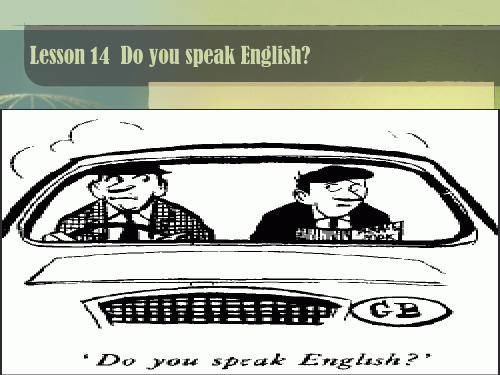
【课文讲解】
1.On the way, a young man waved to me. • on one’s way to … 在某人去某地的路上
on one’s way home 某人回家的路上
P30 on the way/ in the way /by the way/ in this way
② vt. 挥动,摇动 wave a hand at sb向某人招手 他们挥着国旗,欢迎我们。 They waved the national flag and welcomed us.
6
New Words and Expressions
wave
① v. 招手
wave to sb. 向某人招手 wave goodbye to sb.向某人挥手再见 他看见我们时,向我们挥了挥手. He waved to us when she saw us.
mother/native language the second language spoken language written language foreign language body language sign language
12
New Words a, 偏重于陆地旅行 2 hours' journey;3 days' journey(三天路 程) 去旅行 go on a journey travel / travelling n. 周游(长途旅行) trip n. 短距离旅行 (时间或距离上较短) tour n. 游玩,环游(为了玩) voyage n. 旅行(海上) flight n. 空中飞行
reply [ri'plai] v. 回答 language ['læ ŋɡwidʒ] n. 语言 journey ['dʒə:ni] n. 旅行
新概念英语第二册Lesson14
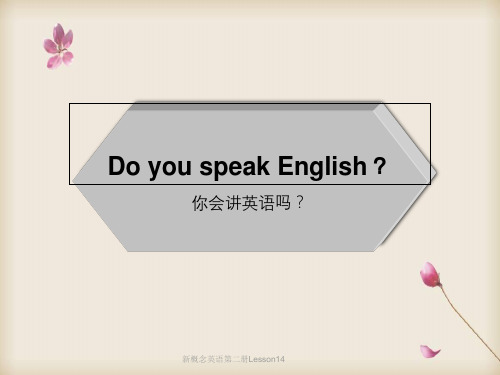
【New words and expressions】
➶ wave v. 招手 ➶ wave to sb;向某人招手
新概念英语第二册Lesson14
【New words and expressions】
⛄ ★lift n. 搭便车 ⛄ be动词+形容词/介词 ⛄ be动词后面不能是名词,一旦是名词,就认为主语和
新概念英语第二册Lesson14
【Further notes on the text】
• 参考译文 • 去年我有过一次有趣的经历。在离开法国南部的一个
小村庄后,我继续驶往下一个城镇。途中,一个青年 人向我招手。我把车停下,他向我提出要求搭车。他 一上车,我就用法语向他问早上好,他也同样用法语 回答我。除了个别几个单词外,我根本不会法语。旅 途中我们谁也没讲话。就要到达那个镇时,那青年突 然开了口,慢慢地说道“你会讲英语吗?” 我很快了解 到,他自己就是个英国人!
新概念英语第二册Lesson14
【New words and expressions】
♚ experience n. 经历 ♚ 经验:不可数名词 ♚ 经历:可数名词 ♚ He has a lot of experience. ♚ He has a lot of experiences. ♚ +s(a/an),经历;原形,经验 ♚ experienced:有经验的 ♚ He is an experienced doctor.
发出信号
新概念英语第二册Lesson14
【Further notes on the text】
♚ 课文内容: ♚ I stopped and he asked me for a lift. As soon as
新概念英语第二册Lesson14

➢ 在离开法国南部的一个小村庄之后,我继 续驶往下一个城镇。
➢பைடு நூலகம்语言点1 此句时间状语从句为“after +过 去完成时〞,主句用一般过去时。
【Further notes on the text】
♚ Notes on the text课文注文注释释 ♚ 1 drove on to the next town. 我继续驶往下一个城
镇。 句中的副词on有“继续地〞;“不停顿地〞的 意思。 ♚ 2 on the way, 在途中。 ♚ 3 ask for a lift, 要求搭车。 ♚ 4 apart from, 除了……以外。 ♚ 5 As I soon learnt, he was English himself!我很快 就知道,他自己就是个英国人。
⛄ 本文语法:过去完成时 ⛄ 语法归纳:过去完成时的形式:had +过去分词 ⛄ 表示过去某个时间以前已经完成的动作或存在的状态。一般总结为:过
去的过去发生到过去完毕。经常与过去时间状语连用。
⛄ By the end of last month I had worked in New Oriental School for six years.
other? • What did the young man say at the end of the
journey? • Was he English himself ,or was he French?
【Further notes on the text】
_新概念英语第二册第14课 课文详解、翻译及语法

Lesson 14Do you speak English?你会讲英语吗?First listen and then answer the question.听录音,然后回答以下问题。
Did the young man speak English?I had an amusing experience last year. After I had left a small village in the south of France, I drove on to the next town. On the way, a young man waved to me. I stopped and he asked me for a lift. As soon as he had got into the car, I said good morning to him in French and he replied in the same language. Apart from a few words, I do not know any French at all. Neither of us spoke during the journey. I had nearly reached the town, when the young man suddenly said, very slowly, "Do you speak English?' As I soon learnt, he was English himself!'New words and expressions 生词和短语amusing adj. 好笑的,有趣的experience n. 经历wave v. 招手lift n. 搭便车reply v. 回答language n. 语言journey n. 旅行参考译文去年我有过一次有趣的经历。
(完整版)新概念英语第二册:第14课课文详解及语法解析

新概念英语第二册:第14课课文详解及语法解析课文详注 Further notes on the text1.After I had left a small village in the south of France, I drove on to the next town.在离开法国南部的一个小村庄后,我继续驶往下一个城镇。
(1)表示一个大范围中的某一个地方时要用介词in:Beijing is in the north of China.北京位于中国的北部。
(2)副词on紧跟在动词后面时能够表示“向前”、“继续下去”等意义:He talked on until everybody had gone.他滔滔不绝地讲到大家都走了。
I was reading when my friend called. After he had gone,I went on to read.我朋友来看我时我正在看书。
他走了以后我便继续看书。
2.I stopped and he asked me for a lift.我把车停下,他向我提出要求搭车。
名词lift的含义之一是“(给步行者)搭便车”、“免费搭车”:Last night, I had to walk home. No one would give me a lift.昨晚我不得不走回家。
谁也不愿意让我搭车。
I was lucky today. I got a lift soon after I had leftthe village.我今天运气好,离开村子不久就搭上了便车。
3.As soon as he had got into the car, I said goodmorning to him in French and he replied in the same language.他一上车,我就用法语向他问早上好,他也同样用法语回答我。
(1)表示时间的固定短语as soon as通常表示“一……就……”,即两个动词之间相隔时间非常短:Tell him the news as soon as you meet him.你一遇见他就把这消息告诉他。
新概念英语第二册笔记新版:第14课
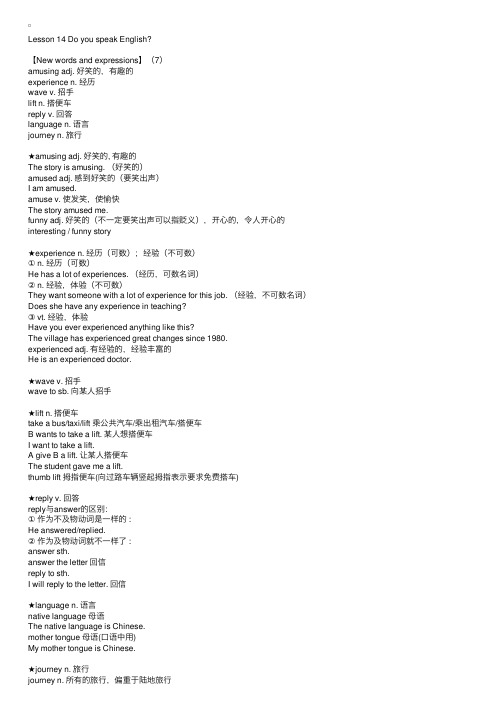
Lesson 14 Do you speak English?【New words and expressions】(7)amusing adj. 好笑的,有趣的experience n. 经历wave v. 招⼿lift n. 搭便车reply v. 回答language n. 语⾔journey n. 旅⾏★amusing adj. 好笑的, 有趣的The story is amusing. (好笑的)amused adj. 感到好笑的(要笑出声)I am amused.amuse v. 使发笑,使愉快The story amused me.funny adj. 好笑的(不⼀定要笑出声可以指贬义),开⼼的,令⼈开⼼的interesting / funny story★experience n. 经历(可数);经验(不可数)① n. 经历(可数)He has a lot of experiences. (经历,可数名词)② n. 经验,体验(不可数)They want someone with a lot of experience for this job. (经验,不可数名词)Does she have any experience in teaching?③ vt. 经验,体验Have you ever experienced anything like this?The village has experienced great changes since 1980.experienced adj. 有经验的,经验丰富的He is an experienced doctor.★wave v. 招⼿wave to sb. 向某⼈招⼿★lift n. 搭便车take a bus/taxi/lift 乘公共汽车/乘出租汽车/搭便车B wants to take a lift. 某⼈想搭便车I want to take a lift.A giveB a lift. 让某⼈搭便车The student gave me a lift.thumb lift 拇指便车(向过路车辆竖起拇指表⽰要求免费搭车)★reply v. 回答reply与answer的区别:①作为不及物动词是⼀样的 :He answered/replied.②作为及物动词就不⼀样了 :answer sth.answer the letter 回信reply to sth.I will reply to the letter. 回信★language n. 语⾔native language 母语The native language is Chinese.mother tongue 母语(⼝语中⽤)My mother tongue is Chinese.★journey n. 旅⾏journey n. 所有的旅⾏,偏重于陆地旅⾏go on a journey2 hours' journey;3 days' journey(三天路程)trip n. 短距离旅⾏或出差(时间或距离上较短)go on a trip = go on businesstravel n. 周游(长途旅⾏)tour n. 游玩(为了玩)tourist n. 游客voyage n. 旅⾏(海上)flight n. 空中飞⾏【Text】I had an amusing experience last year. After I had left a small village in the south of France, I drove on to the next town. On the way, a young man waved to me. I stopped and he asked me for a lift. As soon as he had got into the car, I said good morning to him in French and he replied in the same language. Apart from a few words, I do not know any French at all. Neither of us spoke during the journey. I had nearly reached the town, when the young man suddenly said, very slowly, "Do you speak English?' As I soon learnt, he was English himself!'参考译⽂去年我有过⼀次有趣的经历. 在离开法国南部的⼀个⼩村庄后, 我继续驶往下⼀个城镇. 途中, ⼀个青年⼈向我招⼿. 我把车停下,他向我提出要求搭车. 他⼀上车, 我就⽤法语向他问早上好, 他也同样⽤法语回答我. 除了个别⼏个单词外, 我根本不会法语. 旅途中我们谁也没讲话. 就要到达那个镇时, 那青年突然开了⼝, 慢慢地说道 : “你会讲英语吗?”我很快了解到, 他⾃⼰就是个英国⼈!【课⽂讲解】1、After I had left a small village in the south of France, I drove on to the next town.after引导的从句如果⼀个是过去时,⼀个是过去完成时,那⼀定是从句⽤过去完成时;before引导的从句表⽰“在……之前”,主句发⽣在从句之前, 主句⽤过去完成时。
新概念英语第二册逐句精讲语言点第14课(3)

新概念英语第二册逐句精讲语言点第14课(3)Lesson 14 Do you speak English?课文内容:I had an amusing experience last year. After I had left a small village in the south of France, I drove on to the next town. On the way, a young man waved to me. I stopped and he asked me for a lift. As soon as he had got into the car, I said good morning to him in French and he replied in the same language. Apart from a few words, I do not know any French at all. Neither of us spoke during the journey. I had nearly reached the town, when the young man suddenly said, very slowly, ‘Do you speak English?' As I soon learnt, he was English himself.精讲笔记:7.Neither of us spoke during the journey.在旅途中,我们两个人都没有说话。
语言点比较学习“...of+范围”结构的短语:1)neither of两者中任何一个都不能够(谓语动词一般用单数)Neither of them has train tickets.他们俩都没有火车票。
2)either of两者中任何一个都能够Either of the brothers will come.这兄弟俩中会来一个。
新概念英语第二册 Lesson_14

Listen to the tape
What happened when the writer was driving to a town in France? A young man waved to the writer and asked for a lift.
listen to the tape again then discuss
Lesson 14 Do you speak English ?
everyday Pronuciation
Intonation
enjoy the song
• my heart will go on
• • • • • • • • • • • • • •
every night in my dreams i see you, i feel you that is how i know you go on far across the distance and the spaces between us you have come o show you go on near far whenever you are i believe that the heart does go on once more you open the door and you're here in my heart and my heart will go on and on love can touch us one time and last for a lifetime and never let go till we're one love was when i loved you one true time i hold you in my life we'll always go on
(完整版)新概念第二册第14课课文讲解
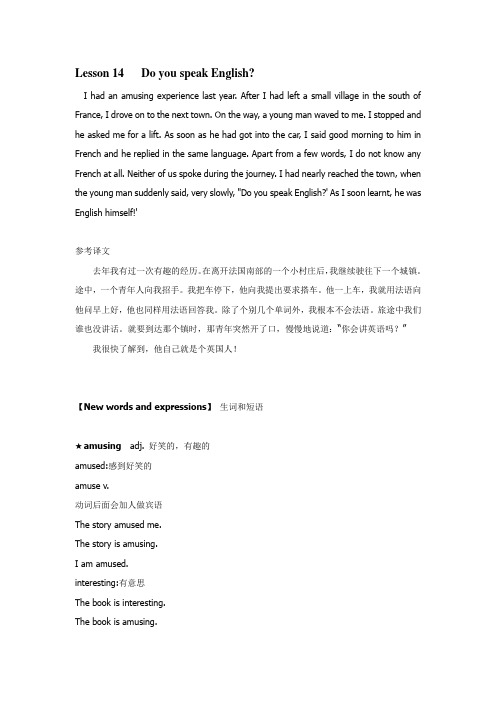
Lesson 14 Do you speak English?I had an amusing experience last year. After I had left a small village in the south of France, I drove on to the next town. On the way, a young man waved to me. I stopped and he asked me for a lift. As soon as he had got into the car, I said good morning to him in French and he replied in the same language. Apart from a few words, I do not know any French at all. Neither of us spoke during the journey. I had nearly reached the town, when the young man suddenly said, very slowly, "Do you speak English?' As I soon learnt, he was English himself!'参考译文去年我有过一次有趣的经历。
在离开法国南部的一个小村庄后,我继续驶往下一个城镇。
途中,一个青年人向我招手。
我把车停下,他向我提出要求搭车。
他一上车,我就用法语向他问早上好,他也同样用法语回答我。
除了个别几个单词外,我根本不会法语。
旅途中我们谁也没讲话。
就要到达那个镇时,那青年突然开了口,慢慢地说道:“你会讲英语吗?”我很快了解到,他自己就是个英国人!【New words and expressions】生词和短语★amusing adj. 好笑的,有趣的amused:感到好笑的amuse v.动词后面会加人做宾语The story amused me.The story is amusing.I am amused.interesting:有意思The book is interesting.The book is amusing.funny:好笑的,可以指贬义,开心的,令人开心的interesting/funny story★experience n. 经历经验、体验:不可数名词经历、感受:可数名词He has a lot of experience. He has a lot of experiences.Experience is the best teacher. 经验是最好的老师。
新概念第二册lesson14

Special Difficulties
besides , except , except for & apart from
Besides Tom, I invited his classmates
Tom
我邀请了汤姆和他的同学
His classmates
▪ Lift 1) 本意指举起,抬起 2)雾。云等的消散,3)电梯 4)搭便车
▪ A give B a lift. 让某人搭便车 ▪ take a bus/taxi/lift 乘公共汽车/乘出租汽车/搭便车 ▪ B wants to take a lift. 某人想搭便车 ▪ thumb lift 拇指便车(向过路车辆竖起拇指表示要求免
Language Points
5. Apart from a few words, I do not know any French at all. 1) apart from = except for 除了…之外 e.g. We had a good time except for the weather. Apart from apple, I like orange. Apart from English, I like Chinese. 2) not…at all 根本不
某人
▪ I asked (Mary) a question.
▪ They asked Tony to sing a song. ▪ ask for 要,要求(某样东西)
▪ I asked for a cup of coffee, but they gave me a cup of tea./You are always asking for help.
新概念笔记第二册14课

Lesson 14 Do you speak English? 你会说英语吗?一、单词讲解【New words and expressions】生词和短语(7)amusing adj. 好笑的,有趣的experience n. 经历wave v. 招手lift n. 搭便车reply v. 回答language n. 语言journey n. 旅行amusing adj. enjoyable, causing laughter or smiles 好笑的,有趣的causing成为…的原因(cause的现在分词形式)amuse [ə'mju:z] v. 娱乐; 消遣; 使发笑; 使愉快make sb laugh or smile 使人发笑或微笑eg. Everyone was amused at the cute boy.大家都被这个可爱的孩子逗乐了。
or: Everyone was amused by the cute boy.eg. The amusing story amused the children.这个好笑的故事把孩子们都逗乐了。
be amused at/by 因…感到好笑be amused to do sth 做…取乐amusement [ə'mjuːzm(ə)nt] n. 娱乐,消遣 [U]eg. She looked at me in amusement.她饶有趣味地看着我。
experience [iks'piəriəns]1) n. 经历,阅历 [C]an amusing experience 一次好笑的经历an unpleasant experience 一次不愉快的经历an unusual experience 一次不同寻常的经历eg. He had many amusing experiences while traveling in France.当他在法国旅行时,有过许多有趣的经历。
新概念第二册Lesson 14知识要点总结

新概念第二册Lesson 14 复习要点一.词汇拓展:1.amusing/amused/amusementI had an amusing experience last year.去年我有过一次好笑的经历。
He told me a story and I was amused.他给我讲了个故事,我觉得很好笑。
To my amusement,he fell on a banana skin.使我觉得好笑的是,他踩到香蕉皮滑倒了。
Surprise/surprised/surprisingShock/shocked/shockingExcitement/excited/exciting2.experience/experiencedShe is an experienced teacher.她是一位有经验的老师。
She has a lot of experience.她很有经验。
She told me about her experiences in South Africa.她跟我谈起了她在南非的经历。
3.wave to..../shake----shook-----shakenShe waved to the driver and the bus stopped.她对司机挥了挥手,公车停下来了。
He didn’t know about it,so he shook his head.他不知道这件事情,所以他摇了摇头。
I like to walk in the waves on the beach.我喜欢走在海边的海浪里。
4.LiftHe lifted the heavy box.他举起了那个沉重的箱子。
He disappeared in the lift.他进了电梯,消失了。
5.reply toYou didn’t reply to my letter.你没有回我的信。
I didn’t receive your reply.我没有收到你的回复。
(完整版)新概念英语第二册:第14课课文详解及语法解析
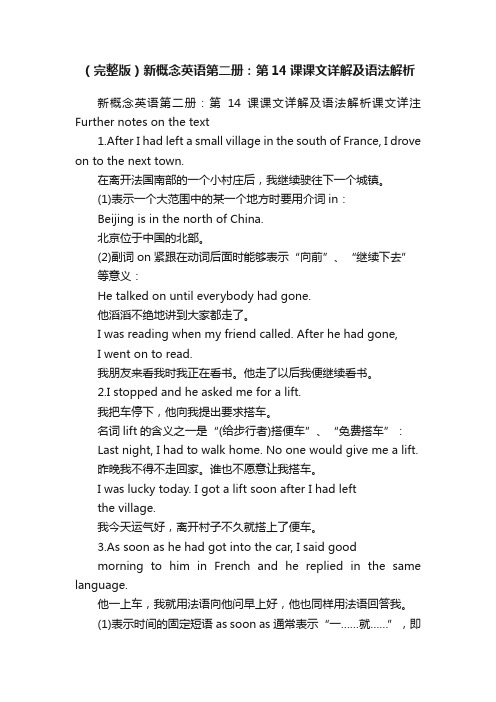
(完整版)新概念英语第二册:第14课课文详解及语法解析新概念英语第二册:第14课课文详解及语法解析课文详注Further notes on the text1.After I had left a small village in the south of France, I drove on to the next town.在离开法国南部的一个小村庄后,我继续驶往下一个城镇。
(1)表示一个大范围中的某一个地方时要用介词in:Beijing is in the north of China.北京位于中国的北部。
(2)副词on紧跟在动词后面时能够表示“向前”、“继续下去”等意义:He talked on until everybody had gone.他滔滔不绝地讲到大家都走了。
I was reading when my friend called. After he had gone,I went on to read.我朋友来看我时我正在看书。
他走了以后我便继续看书。
2.I stopped and he asked me for a lift.我把车停下,他向我提出要求搭车。
名词lift的含义之一是“(给步行者)搭便车”、“免费搭车”:Last night, I had to walk home. No one would give me a lift.昨晚我不得不走回家。
谁也不愿意让我搭车。
I was lucky today. I got a lift soon after I had leftthe village.我今天运气好,离开村子不久就搭上了便车。
3.As soon as he had got into the car, I said goodmorning to him in French and he replied in the same language.他一上车,我就用法语向他问早上好,他也同样用法语回答我。
新概念英语第二册重点语法句型第14课

新概念英语第二册重点语法句型第14课一、重要句型或语法1、过去完成时表示过去发生的动作对过去造成的影响或结果。
如:He had finished his job before the boss came back. 本课新出现了had nearly done...when...的句型,如:I had nearly reached home when it began to rain heavily.二、课文主要语言点I had an amusing experience last year. 1)have an experience,有...的经历。
注意experience表经历时,是可数名词;表经验时,是不可数的。
2)amusing,好笑的,来自amuse,使开心。
After I had left a small village in the south of France,I drove on to the next town. 1)可提问学生为什么句中的leave要用过去完成时。
2)the south of France,发过的南部。
可引出the south of China(中国南部)与South China(华南)的区别。
On the way, a young man waved to me. 1)on the way,在路上,此处用逗号与后文隔开,能够凸显后文。
2)wave to sb.,想某人招手示意。
I stopped and he asked me for a lift. ask sb. for a lift,向某人要求搭车。
As soon as he had got into the car, I said good morningto him in French and he replied in the same language. 1)可提问学生get into为何使用过去完成时。
新概念第二册第 14课时

Hawaii
France
reply v.回答
reply与answer的区别: ① 作为不及物动词是一样的 :
He answered/replied. ② 作为及物动词就不一样了 :
answer sth. answer the letter 回信
reply to sth. I will reply to the letter. 回信
★ lift n. 搭便车
take a lift. 搭便车 我想要搭便车
I want to take a lift. take a bus/taxi 乘公共汽车/乘出租汽车
give sb. a lift. 让某人搭便车 学生让我搭便车
The student gave me a lift. 在国外如何搭便车,你知道吗?
language n. 语言(不可数)
native language 母语 我们的母语是汉语。
The native language is Chinese. mother tongue 母语(口语中用)
我们的母语是汉语。 My mother tongue is Chinese.
journey n. 旅行
Lesson 14 Do you speak English ?
New words and expressions 生词和短语
amusing adj 好笑的,有趣的
这个故事很好笑 The story is amusing. amused adj. 感到好笑的(要笑出声) 这个故事让我感到好笑 The story amused me. funny adj. 好笑的(不一定要笑出声可以 指贬义),开心的,令人开心的
journey n. 所有的旅行,偏重于陆地旅行 go on a journey 去旅行
新概念第二册第14课
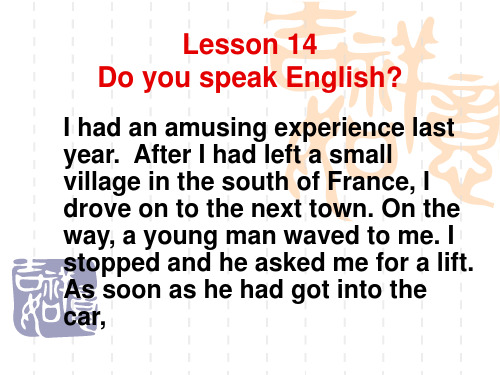
5、as soon as 一…就…,连接时间状 语从句。例句:I’ll call you as soon as I arrive there. say good morning/hello/goodbye /sorry to sb. 向某人说早上好/你好/再 见/对不起。 reply to 回应 ≈ 回答 answer 例句: He answered/replied to my letter. in +某种语言。
三、精讲课文 1、I had an amusing experience last year. amusing = interesting = funny 有趣 的,引人发笑的。be amused验:不可数名词。 He has a lot of experience. experience ② 经历:可数名词。 He has a lot of experiences.
2、in the south of France = in South France 在法国南部。 drive on to... 继续驶往… 3、On the way, a young man waved to me. on the/one’s way (to some place) 在 去某地的途中。 wave to sb. 向某人挥手。例如:I waved goodbye to her.
I said good morning to him in French and he replied in the same language. Apart from a few words, I do not know any French at all. Neither of us spoke during the journey.
新概念英语第二册Lesson14 (共25张PPT)

• 类似词语: • excite --exciting --excited • interest ---interesting --- interested • move ---moving ---moved
• a. 副词on紧跟在动词后,表示继续,向前的意思) • 他说个不停
• He talked on and on • 让我们走吧
• L et us go on. • drive to 开车去某地 • b.过去完成时 • He talked on until everybody had gone. • 他滔滔不绝地讲到大家都走了。
Lesson 14 Do you speak English ?
• amusing • experience • wave • lift • reply • language • journey
New words and expressions
• 1. amusing adj. (令人感到)好笑的,有趣的 • The story is amusing. • amused: adj. 感到好笑的 • I am amused. • amuse v. 使发笑,使愉快 • The story amused me.
to him in French and he replied in the same language. ④Apart from a few words, I do not know any French at all.⑤Neither of us spoke during the journey. I had nearly reached the town, when the
新概念英语第二册lesson14
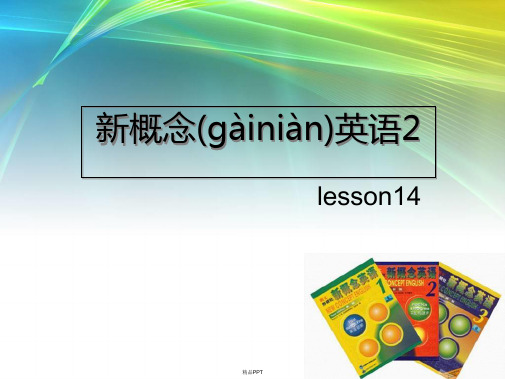
lesson14
精品PPT
精品PPT
单词(dāncí)讲解
• amusing adj 好笑的,有趣的
• experience n 经历
• wave v招手
பைடு நூலகம்
• lift
n 搭便车
• reply v回答
• language v语言(yǔyán)
• journey n旅行
精品PPT
• wave • 1) v. 指固定的物体上下或往复(wǎngfù)摆动或摇动 • a flag waving in the breeze • 2) v.挥手,招手 • Wave to sb • Wave at sb • 3)vt. 挥动 • wave a hand 挥手 • wave a flag • wave an umbrella • wave sb goodbye /wave goodbye to sb • 4) n. 波浪,挥手
• 做环游世界的旅行
• Make a voyage around the world
• Take a voyage around the world
• Eg. He is now on the voyage home
• 他正在(zhèngzài)回航途中
• Trip v. 绊倒
• Eg. She tripped over the carpet and fell
精品PPT
• Trip n (美)包括乘短途交通工具以及徒步远足的所有旅行
•
(英)通常指短途的观光旅行
• A bus trip
• A business trip
• Take a trip
• Voyage 航海,航行,乘船旅行
- 1、下载文档前请自行甄别文档内容的完整性,平台不提供额外的编辑、内容补充、找答案等附加服务。
- 2、"仅部分预览"的文档,不可在线预览部分如存在完整性等问题,可反馈申请退款(可完整预览的文档不适用该条件!)。
- 3、如文档侵犯您的权益,请联系客服反馈,我们会尽快为您处理(人工客服工作时间:9:00-18:30)。
新概念英语第二册:第14课课文详解及语法解析课文详注 Further notes on the text
1。
After I had left a small village in the south of France, I
drove on to the next town.
在离开法国南部的一个小村庄后,我继续驶往下一个城镇。
(1)表示一个大范围中的某一个地方时要用介词in:
Beijing is in the north of China。
北京位于中国的北部。
(2)副词on紧跟在动词后面时能够表示“向前"、“继续下去”等意义:
He talked on until everybody had gone。
他滔滔不绝地讲到大家都走了。
I was reading when my friend called。
After he had gone, I went
on to read。
我朋友来看我时我正在看书。
他走了以后我便继续看书。
2.I stopped and he asked me for a lift。
我把车停下,他向我提出要求搭车.
名词lift的含义之一是“(给步行者)搭便车”、“免费搭车”:
Last night, I had to walk home. No one would give me a lift.
昨晚我不得不走回家。
谁也不愿意让我搭车。
I was lucky today。
I got a lift soon after I had left the village.
我今天运气好,离开村子不久就搭上了便车。
3.As soon as he had got into the car, I said good morning to him in French and he replied in the same language.
他一上车,我就用法语向他问早上好,他也同样用法语回答我。
(1)表示时间的固定短语as soon as通常表示“一……就……”,即两个动词之间相隔时间非常短:
Tell him the news as soon as you meet him.
你一遇见他就把这消息告诉他。
(2)表示用某种语言作为交际手段时介词用in,表示讲某种语言时能够不加介:
speak English/ French
讲英语/法语
That book is written in German。
那本书是用德语写的.
He replied the question in English.
他用英语回答了这个问题。
语法 Grammar in use
过去完成时(The simple past perfect tense)
过去完成时由 had+ 过去分词构成,它表示过去某时或某动作发生之前已经完成的动作或情况,即“较早的过去".在用过去完成时态的句子中,常用的连词when, after, as soon
as, until, by that time等:
When I woke up in the morning, she had already had her breakfast.
当我早上醒来时,她已经吃过早饭了。
After he had said goodbye to us all, Captain Alison started his journey.
当艾利森船长和我们大家都道了别之后,他就启程了。
Did you really ring the police?
你真的给警方打电话了?
It was a mistake。
I realized it as soon as I had rung them.
我犯了个错误.刚给他们打完电话我就意识到了。
I didn’t know that she was a famous actress until you had told me。
直到你告诉我时我才知道她是位名演员。
常与现在完成时连用的副词如already, just, never,never…before也常与过去完成时连用,以强调事件发生的先后次序:
The boys loved the zoo. They had never seen wild animals before.
男孩们喜欢动物园,以前他们从没见过野兽。
在有些用过去完成时的句子中没有明确的时间状语,但通过上下文能够看出动作发生的先后:
The bus finally came. I had waited for 40 minutes。
公交车终于来了.我已经等了40分钟。
